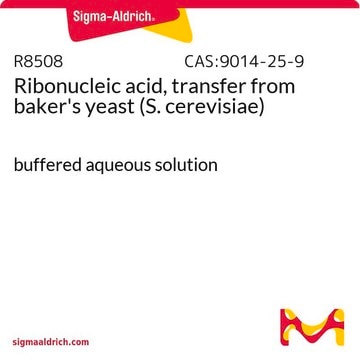10108626001
Roche
Poly(A)
lyophilized, suitable for PCR, pkg of 100 mg
Sinonimo/i:
Poly(A), Polyadenylic acid
About This Item
Prodotti consigliati
Descrizione
Polyadenylic acid
Livello qualitativo
Forma fisica
lyophilized
PM
700-3500 kDa
Confezionamento
pkg of 100 mg
Produttore/marchio commerciale
Roche
Concentrazione
0.5 mg/mL (Working concentration)
tecniche
PCR: suitable
Colore
white
Solubilità
water: soluble
Rapporto di assorbanza
A290/260 nm 0.03-0.05
A280/260 nm 0.28-0.32
A250/260 nm 0.86-0.90
Temperatura di conservazione
2-8°C
Descrizione generale
Applicazioni
Azioni biochim/fisiol
Qualità
2.3μmol/mg Poly(A) (from absorbance) in relation to one mononucleotide unit. Chromatographically homogeneous.
Absorbance determination A250/A260, A280/A260, A290/A260
Sequenza
Definizione di unità
Stato fisico
Nota sulla preparazione
A concentration of 0.5 mg/ml is recommended.
Working solution: 0.5 mg/ml is recommended.
Altre note
Codice della classe di stoccaggio
11 - Combustible Solids
Classe di pericolosità dell'acqua (WGK)
WGK 1
Punto d’infiammabilità (°F)
Not applicable
Punto d’infiammabilità (°C)
Not applicable
Certificati d'analisi (COA)
Cerca il Certificati d'analisi (COA) digitando il numero di lotto/batch corrispondente. I numeri di lotto o di batch sono stampati sull'etichetta dei prodotti dopo la parola ‘Lotto’ o ‘Batch’.
Possiedi già questo prodotto?
I documenti relativi ai prodotti acquistati recentemente sono disponibili nell’Archivio dei documenti.
Il team dei nostri ricercatori vanta grande esperienza in tutte le aree della ricerca quali Life Science, scienza dei materiali, sintesi chimica, cromatografia, discipline analitiche, ecc..
Contatta l'Assistenza Tecnica.








